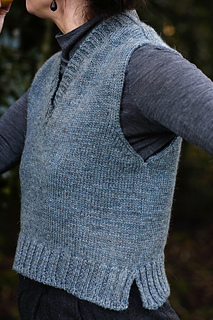patterns >  Ailbíona McLochlainn
Ailbíona McLochlainn
> Cutting Edge Vest























Cutting Edge Vest
………………..
CUTTING EDGE VEST
With an overlapping neckband and turned edgings, this basic sweater-vest is as minimal as it is elegant. But the classic design harbours a hidden feature: From cast-on to bind-off, this vest is worked entirely in the round - then steeked open to reveal its finished form.
This method dramatically reduces knitting time compared to traditional vest construction, eliminating the need to work the back and the front panels separately. (Aside from that, it is quite frankly fun to knit a thing that looks like a large hat, then transform it into a vest with a few quick snips!)
Instructions include options for a traditional v-neck edging, a shawl collar, and a clean neckline finish. You can also choose between a straight or an A-Line bodice, and between a continuous or a split hem.
Suitable for both new and experienced steekers, the Cutting Edge Vest is a quick and engaging project that will work with a variety of natural wool yarns.
………………..
MATERIALS & INFORMATION
Size 1 (2, 3, 4, 5, 6, 7, 8, 9, 10)
measures as follows around chest circumference:
84.5cm/ 33.75” (91cm/ 36.5”, 98cm/ 39.25”, 106.5cm/ 42.5”, 115.5cm/ 46.25”, 124.5cm/ 49.75”, 133.5cm/ 53.5”, 142cm/ 56.75”, 151cm/ 60.5”, 160cm/ 64”)
Fit Recommendation
to be worn with 10cm/ 4” of ease (or more if opting for an oversized fit)
Gauge
18 sts x 24 rounds = 10cm x10cm/ 4” x 4”
in stockinette for main fabric
Needles
circular needles 4.5mm in diameter,
or as needed to meet gauge for main fabric
Yarn
suitable for steekable yarns, DK-Aran weight
(approximately 160-200m/ 175-225y per100g/ 3.5oz)
project requires 3 (3, 3, 4, 4, 4, 4, 4, 5, 5) 100g/ 3.5oz skeins
(note that Sizes 3&8 are ‘on the cusp’ and may require starting an additional skein if using a yarn at the heavier end of the spectrum, and/ or if opting for the shawl collar version)
Notions
st markers, measuring tape, scissors, steam iron,
sewing needle and thread
Special Techniques
steeking;
optional for shawl collar version: short rows
optional for clean edge version: i-cord bind-off & Kitchener st
………………..
SAMPLES INFO.
Slate-Blue Vest:
made with Woolly Mammoth Fibre Co. Hearth Sock 4-Ply
(held double)
Size 3, with v-neck edging and split hem
Cream Vest:
made with Galway Wool Co.
Size 4, with shawl collar and split hem
Grey Vest:
made with Höner och Eir Nutiden (held double)
Size 3, with clean edge neckline and split hem
Dark Taupe Vest:
made with Höner och Eir Nutiden (held double)
Size 4, with v-neck edging and split hem
The model is a size 12/14 UK, with a chest circumference of 90cm/ 36”.
………………..
NOTES ON STEEKING
This pattern is ideal for first-time steekers. Detailed instructions, as well as a diagram, are provided to illustrate the process.
Yarn Recommendation
This project is suitable for steekable yarns only. Typically, such yarns have the following properties: They are 100% wool, non-superwash, and woollen-spun. If the yarn is described as ‘suitable for felting’ by the manufacturer, this is a good indicator that it is steekable. If unsure about your yarn’s suitability, the pattern describes a swatching method that will help you make sure your yarn is suitable.
Working with a Steam Iron
Be aware that a steam iron is required for the completion of this project, as is a willingness to press aggressively where indicated. Some knitters believe that applying heat directly to a knitted fabric will damage the fabric. However, when working with 100% wool, this is a misconception. Pressing is a crucial part of this design. The edges will not lie flat and crisp unless you press them, essentially setting them with heat. If you are worried about damaging the fabric, use a thin pressing cloth between the iron and the fabric.
30792 projects
stashed
46608 times
30191 projects
stashed
18723 times
65209 projects
stashed
61864 times
9973 projects
stashed
12145 times
496 projects
stashed
440 times
193 projects
stashed
270 times
- First published: November 2022
- Page created: November 17, 2022
- Last updated: May 31, 2023 …
- visits in the last 24 hours
- visitors right now




